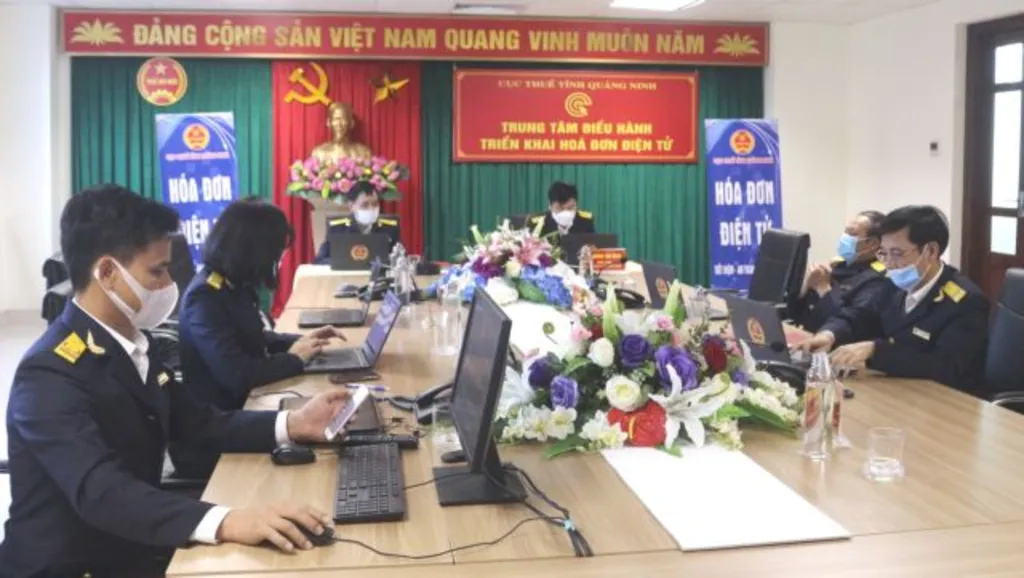 Economy
Economy

 |
| Officials at the provincial Tax Department gives online assistance to firms who begin to employ e-invoices. Quảng Ninh is one of the first six provinces to establish phase-one e-invoice systems. — VNA/VNS Photo Nguyễn Thị Vân |
{ "id": "Dyb-khGot7", "type": "myToolImages", "data": { "data": "" } }
HÀ NỘI — Quảng Ninh Province is sparing no effort stepping up administrative reform, digital transformation and socio-economic development.
Secretary of Quảnh Ninh Province's Party's Committee Nguyễn Xuân Ký underlined administration reform as an issue on top of the provincial agenda.
He said the province needs to raise public performance indicators, including PCI, PAR and PAPI, to improve citizen satisfaction with public services and trust in public institutions.
To this end, it aims to take a national lead in terms of the Provincial Competitiveness Index (PCI), Public Administration Reform Index (PAR), and Provincial Governance and Public Administration Performance Index (PAPI) by 2025.
One of its objectives is to cut the number of its public non-business units by 10 per cent compared to 2021 and do the same to the number of its public employees on the payroll.
Another is to have at least 20 per cent of the units capable of financing their regular spending and one district-level unit capable of balancing its budget.
By 2025, all documents are expected to be processed and monitored on the provincial public service portal, which is connected and synchronised with the National Public Service Portal.
Regarding digital transformation, the province will buckle down to position itself among the top three provinces in Digital Transformation Index by 2025, becoming a role model in the field.
They want all provincial agencies equipped with adequate facilities to implement digital transformation and provide open data.
The next objective is to ensure that at least 50 per cent of firms in industrial parks integrate digital technology into their operation, 100 per cent of citizens are granted a digital identity, and every single family has their own digital address.
Another objective is to get all administrative jobs done online, from commune to provincial level. Additionally, level-4 public services are expected to become accessible via various devices, including smartphones.
On such grounds, it aims to raise the rate of documents processed online under level-4 public services to 70 per cent.
For the time being, the province provides 1,222 level-3 and -4 out of 1,591 public services on the National Public Service Portal, equivalent to a rate of 76 per cent.
The rate of documents successfully handled on and ahead of schedule in the first eight months of 2022 hit 97.67 per cent, the second-highest nationwide.
For 2023, it strives to digitalise and e-sign 100 per cent of its paper-based documents that were processed previously and launch eight database systems for eight areas, including land, healthcare and education.
Regarding socio-economic development, the province expects to have at least 10,000 newly-established firms and attract over US$5 billion of foreign direct investment.
It endeavours to have 50 digital technology firms by 2025 and raise the figure to 500 by 2030, among which there are firms capable of producing 'made-in-Vietnam' core-technology products.
To this end, it will embrace a more hands-off approach to its administration, especially in the fields of land, finance and investment. Additionally, it will focus more on feedback and handling complaints to ensure every voice is heard.
 |
| COVID-19 patients in Quảng Ninh get an online consultation via a healthcare application. Digital transformation has become the order of the day in the province. VNA/VNS Photo Nguyễn Thị Vân |
{ "id": "vyF8jeMRrz", "type": "myToolImages", "data": { "data": "" } }
The province will also support firms through a more subject-specific approach to remove obstacles facing the firms and through more favourable policies on startups, innovations and investments.
It is worth noting that Quảng Ninh came first in PCI for five consecutive years, from 2017 to 2021, and was among the top five direct-controlled municipalities in economic management between 2013 and 2021.
By October, the province has offered 1,806 public services, including 194 level-3 and 1,429 level-4. In addition, the administrative process at 14 province and district-level and 177 commune-level administrative centres have been standardised in line with ISO standards and connected to the Government's supervisory system.
The province has also established more than 1,400 digital technology community groups, of over 11,000 members, in all its communes to assist locals in digital administration. It has earned a score of 10.5 for online public services so far, being at the forefront of e-government.
The province has also signed a memorandum of cooperation with three leading telecommunication companies in Việt Nam - FPT, Viettel, and VNPT - to foster e-government, digital economy and digital society.
Under the memorandum, the companies are tasked with investing in new information technology facilities and developing new digital platforms to promote digital transition in the province. — VNS




